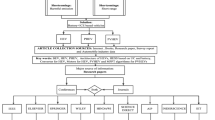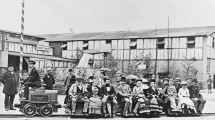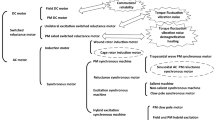Abstract
In order to obtain better economy and power performances of compressed natural gas (CNG) and electric hybrid city bus, the powertrain system is designed and studied in this paper. Based on manufacturing technology, operation cost and dynamic property, economy is regarded as the main optimization goal for CNG-electric hybrid city bus, which determines the structure of powertrain system of CNG-electric hybrid city bus. Vehicle control strategy is established by working conditions. Some key component parameters are matched and designed. Work model of motor/generator is established, and torque characteristic curve of motor/generator is obtained. Full vehicle model of CNG-electric hybrid city bus is established by ADVISOR software. Comparison with tradition natural gas city bus, the maximum gradability rises by 69.8%, the maximum gradability of 20 km/h is 25.4%, the maximum speed rises by 8.6%, and the acceleration performance of 0∼50 km/h rises by 21.9%. The fuel consumption reduces by 23.3% in the BC-CTC cycle working condition, and the fuel consumption reduces by 25.1% in the ECE+EUDC cycle working condition. So, the performances of power and economy have been obviously improved, compared with traditional CNG city bus, which indicates that this method can be used to study the powertrain system of CNG-electric hybrid city bus.
Similar content being viewed by others
References
C. Yin and S. Shen, Status and trends of HEV in domestic and international, City Utility, 22(3) (2008) 23–26.
C. Albrichsfeld and J. Karner. Regenerative brake system for hybrid and electric vehicles, SAE Paper No, 2009-01-1217.
Q. Chen, F. Sun and J. Zhu, The technology of the modern electric vehicle, Beijing Institute of Technology Press, Beijing (2002) 13–21.
Q. Chen and H. Shu, Parameter matching and control strategy of parallel powertrain system for CNG-electric hybrid urban bus, Int. J. Electric and Hybrid Vehicle, 4(3) (2012) 248–259.
K. Naotake, A. Motooka and N. Takeda, Super HEV system for super low floor city bus, SAE Paper No, 2001-01-0956.
P. Chen, X. Yu and L. Liu, Zhejiang university powertrain of a parallel CNG-fuel hybrid electric vehicle, Patent No. 200710069746.8.
H. He, F. Y. Yang and Y. P. Yang, Development of CNG fueled series hybrid electric city bus, Journal Automotive Engineering, 30(3) (2008) 202–203.
Y. C. GU, C. L. Yin and J. W. Zhang, Investigation to coordinated torque control strategy of parallel hybrid electric vehicles, Journal of system simulation, 19(3) (2007) 631–636.
Y. J. Huang, C. L. Yin, J. W. Zhang, J. H. Pu and Y. H. Dong, The parameter matching of parallel hybrid electric city-bus power system, Journal of Shanghai Jiao Tong University, 41(2) (2007) 272–277.
T. Banjac, F. Trenc and N. T. Katra, Energy conversion efficiency of hybrid electric heavy-duty vehicles operating according to diverse drive cycles, Energy Conversion and Management, 50(12) (2009) 2865–2879.
C. L. Wang, C. L. Yin and T. Zhang, Powertrain design and experiment research of a parallel hybrid electric vehicle, Int. J. Automobile Technology, 10(5) (2009) 589–596.
D. J. Xuan, J. W. Kim and Y. B. Kim, Optimal operation strategy development for fuel cell hybrid vehicle, Journal of Mechanical Science and Technology, 25(1) (2011) 183–192.
Y. Wang, Y. S. He and B. H. Wang, Parameter simulation on the control strategy for a parallel hybrid electric vehicle by cruise, Journal of Chongqing University, 29(12) (2006) 22–25.
Woo-Joo Yang, Duk-Hyun Yu and Young-Bae Kim, Parameter estimation of lithium-ion batteries and noise reduction using an H∞ filter, Journal of Mechanical Science and Technology, 27(1) (2013) 247–256.
X. Liu, D. Diallo and C. Marchand, Design methodology of hybrid electric vehicle energy source: application to fuel cell vehicles, Int. J. Automotive Technology, 12(3) (2011) 433–441.
Q. N. Wang, H. L. He and Y. D. Li, Study on parameter matching for parallel hybrid electric vehicle powertrain, J. Natural Science Journal of Jilin University of Technology, 30(1) (2000) 72–75.
Hoang Thinh Do and Kyoung Kwan Ahn, Velocity control of a secondary controlled closed-loop hydrostatic transmission system using an adaptive fuzzy sliding mode controller, Journal of Mechanical Science and Technology, 27(3) (2013) 875–884.
Author information
Authors and Affiliations
Corresponding author
Additional information
Recommended by Associate Editor Kyongsu Yi
Qiping Chen received his Ph.D. in Mechanical Engineering in 2013, from Chongqing University, Chongqing, China. He is currently a Lecturer of School of mechatronics engineering, East China Jiaotong University, China. His research interests include electric vehicles, hybrid vehicles, mechatronics, etc.
Hongyu Shu received his Ph.D. in Mechanical Engineering in 1999, from Chongqing University, Chongqing, China. He is currently a professor of State Key Laboratory of Mechanical Transmission, Chongqing University, China. His research and teaching interests include hybrid drive mechatronics, hydraulic shock absorber and vehicle engineering et al. He is currently a senior member of the Chinese Society of Mechanical Engineering.
Kun Wang received his M.S. degree in Mechanical Engineering in 2010, from Chongqing University, Chongqing, China. His research interests include electric vehicles, hybrid vehicles, mechatronics, etc.
Rights and permissions
About this article
Cite this article
Chen, Q., Shu, H. & Wang, K. Study on powertrain system for CNG-electric hybrid city bus. J MECH SCI TECHNOL 28, 4283–4289 (2014). https://doi.org/10.1007/s12206-014-0942-4
Received:
Revised:
Accepted:
Published:
Issue Date:
DOI: https://doi.org/10.1007/s12206-014-0942-4




